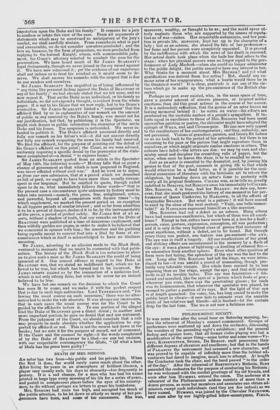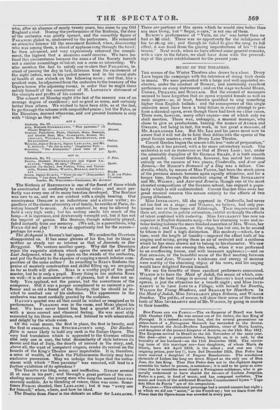PHILHARMONIC SOCIETY.
IT was some time after the usual hour on Saturday morning, be- fore the rehearsal of Monday's concert commenced. Groups of performers were scattered up and down the orchestra, discussing the wonders of the preceding night's exhibition ; and the general feeling and opinion were, that all former violin-playing was but a modification of the same thing—some better and some worse—VI- OTTI, KIESEWETTER, SPOHR, DE BErtioT, each possessing their different degrees of elevation and excellence ; but that in the hands of PAGANINI the instrument had assumed a new character, and was proved to be capable of infinitely more than the boldest ad- venturers had dared to imagine, much less to attempt. At length the Conductor took the chair, and the band passed "to the order of the day." After the rehearsal of BEETHOVEN'S Sinfonia, RIES ascended the orchestra for the purpose of conducting his Sinfonia : he was welcomed with the cordial greetings of his old friends, and soon after him HUMMEL entered the room. The audience at a rehearsal of the 'Philharmonic seldom consists of more than a dozen persons, as none but members and associates can obtain ad- mission, except such individuals (and they are few indeed) as we have named. Hi:3mm was joined by the Chevalier NE111E01114 and soon after by our highly-gifted fellow-countryman, FIELD, who, after an 'absence of nearly twenty years, has come to pay Old 'England a visit. Miring the performance of the Sinfonia, the`door nf-the orchestra was gently opened, and the unearthly figure of PAGANINI glided in, unobserved.by the performers. He remained an attentive listener till the movement finished, when, discovering who was among them, a shout of applause rang through the band ; he then advanced, and very expressively returned the compli- ment, the highest that a musician could receive. We have no- ticed this circumstance because the annas of the Society furnish not a similar assemblage of talent, nor a scene so interesting. We also mention the fact to satisfy our readers that PAGANINI, in- stead of passing the day in bed, delirious from the excitement of the night before, was in his perfect senses and in his usual state of health at one o'clock on the following noon ; and that, like a • prudent man, he adjourned from the orchestra to the treasury of the Opera-house (the adjoining room), in order that he might there satisfy himself of the correctness of M. LAPORTE'S statement of the receipts and profits of his concert.
The concert on Monday night (the last of the season) was of an average degree of excellence ; not so good as some, and certainly better than others. We wished to have been able, as at the last, to go through the scheme with unqualified praise ; but the Fates, or the Directors, decreed otherwise, and our present business is only with "things as they are."
ACT I.
Sinfonia, No. IV Beethoven. Aria, Madame STOCKHAUSEN, "Non parentar," (11 Flout° Blagico) Mozart. Sextuor, Pianoforte, Flute, Clarinet, Horn, Bassoon, and Double Bass, Mrs. ANDERSON, Messrs. Ni- el:OLSON, WILLMAN, PLATT, MACKINTOSn, and DRAGONETTI Onstow. Terzetto,Signor RUBIN1, Signor LABLACHE, and Mr. E. SEGUIN, "Or che la sorte." (Guglielmo Tell) Rossini. Overture, " Der Alchymist," (first time of per- formance Spahr.
ACT D.
Sinfonia, No. VI. F. Ries. Duetto, Madame STOCKHAUSEN and Signor LA- BLACHE, 'Sego', oh cara," (Faust) Spohr.
Quartet (by desire), two violins, Viola, and Violon-
cello, Messrs. Mont, WATTS, MORALT, and LIND LEY Haydn. Scena, Signor Ru " Vicin nil sta l" (Euryanthe) C. M. von Weber. Overture, Les deux Journees." Cherubint. Leader, Mr. WE:eosin—Conductor, Mr. Br SHOP.
The Sinfonia of BEETHOVEN is one of the finest of those which he constructed in conformity to existing rules ; and most per- fectly was every-one of its many beauties developed. The Sextuor was new to us, and we are content with a single hearing. Our countryman *Onsnow is an industrious and a clever writer ; re- gardless of the claims of country or of family, he resides at Paris, de- voting himself to music. As an amateur, he may be allowed to hold a very high rank ; but his writing smells too much of the lamp—it is ingenious, and dexterously wrought out, but it has not the imprint of genius. His Sextuor, though admirably played, faded instantly from our memory. (We ask, in a parenthesis, why ,FIELD did not play? It was an opportunity lost for the season— perhaps for ever.)
The Alchymist is SPOHR'S laslopera. We confess the Overture disappointed us. It has some gleams of his fire, but its blaze is neither so steady nor so intense as that of Jessonda or Der Berggeist. We venture another query. Why did the Directors reject the exquisite sinfonia which opens the second act of The Last Judgment, when it lay open on the stands of the orchestra, and put the Society to the expense of copying a much inferior com- position of the same author ? In awarding to RIES'S Sinfonia the praise of masterly construction and skilful filling up, we are going as far as truth will allow. RIES is a worthy pupil of his great master, but he is only a pupil. Every thing in his sinfonia flows on well—it is all secundem orient —it pleases, but it does not sa- tisfy. You applaud, not the genius, but the correctness of the composer. Still it was a proper compliment to so eminent a pro- fessor and so old a friend of the Society, that he should be in- vited to conduct one of his sinfonias. His appearance in the orchestra was most cordially greeted by the audience. B AYDN'S quartet was all that could be wished or imagined as to performance. PAGANINI was in the room, and Mom played his best. We have never heard him lead a quartet of HAYDN'S with a more correct and classical feeling. He was most ably seconded by his three coadjutors, and listened to with admiration and delight by the whole room. Of the vocal music, the first in place, the first in beauty, and the first in execution, was STOCKHAUSEN'S song. Die Zauber- flOtte is never likely to hold any rank in the Italian Opera. The very bad translation which is appended to the German edition (the only one in use), the total dissimilarity of style between its music and that of Italy, the dearth of interest in the story, and, above all, the want of competent singers, render its revival on the boards of the King's Theatre most improbable. • It is, therefore, a mine of wealth, of which the Philharmonic Society may have exclusive possession. May we indulge the hope that the enthu- siasm with which "Non paventar" was received, will lead to a further exhibition of its splendour?
- The Terzetto was king, noisy; and ineffective. -Runinr seemed ill at ease in his part ; anti through a great portion of the con- cluding movement, the young man who sung the second bass was scarcely audible. • As to blending of voices, there was none. Some- times RUBIN' shouted, then LABLACHE ; but . it was "every one for himself," when, where, and how he liked.
The Duetto from Faust is too delicate an affair for LABLA.CHE. There are portions of this opera which he would sing better than any man living, but" Segni, o earn," is not one of them.
Roanves performance of " Vicin, mi sta." was .better than we had an iei aited. There was no opportunity for the indulgence of his be etttng sin ; and though lie failed to give the song its full effect., it was freed from the glaring imperfections Of his "Ii inio tesoro." Next week, when we have offered some general remarks, with a view to the future, we shall have done with the proceed- ings of this great establishment for the present year.



























 Previous page
Previous page